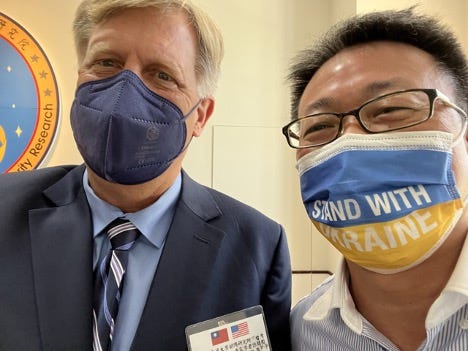Why Taiwan Is Cheering for Ukraine
What happens in Europe today influences what happens in Asia tomorrow
This week, while a large part of the world was celebrating Christmas, tensions were rising in the Taiwan Strait again. China sent 71 military planes into Taiwan’s air defense zone and Taiwan increased mandatory military service for all eligible men from four months to one year. The specter of a People’s Republic of China (PRC) invasion of Taiwan haunts not just Asian security but the entire world. Beijing’s provocative actions this week are a reminder that American national security leaders will be consumed with trying to deter a war over Taiwan for years, if not decades, to come.
Given the high stakes for U.S. and international security in Asia, an often-heard argument in U.S. foreign policy circles is that Russia’s war in Ukraine is a distraction to America’s larger security challenge: the PRC. As a great, yet limited power, the U.S. should prioritize China and Asia, not Russia and Europe, so the argument goes.
That argument is wrong. Of course, dealing with the PRC is this century’s most important foreign policy issue for American decision-makers. But what happens in Europe today does not exist in a void. In fact, it has far-reaching implications for what happens in Asia tomorrow. And no one understands that better than the Taiwanese.
Last August, I traveled to Taiwan with a Hoover Institution and Stanford delegation to meet with President Tsai, and a dozen of her top ministers, the KMT opposition leadership, academics, regional officials, and senior executives at Taiwan’s top semiconductor companies, including TSMC. All meetings were off the record, so I cannot quote people directly. But I will share with you some general impressions about what lessons the Taiwanese are learning from the war in Ukraine.
Most notably, our Taiwanese interlocutors understood clearly that a Ukrainian victory would enhance their security, while a defeat would make their island more vulnerable. At the start of the war, Putin had an overwhelming advantage in terms of the number of soldiers, weapons, and rubles spent on the military, as is the case when comparing PRC capabilities to Taiwanese military resources. A gross Putin miscalculation to that equation was not to include an intangible, immeasurable, but vital metric of war – the will to fight. If or hopefully when Ukraine stops Putin’s invasion, despite being outgunned and outmanned, Beijing will need to reassess its own capabilities, some of which come from Russia, as well as the balance of power regarding the will to fight. Conversely, if Russia wins, the Chinese military’s confidence will increase.
Our Taiwanese interlocutors also analyzed the broader international context surrounding the war in Ukraine. Putin also miscalculated the role of allies and international public opinion regarding his war against Ukraine. He did not expect 141 countries to support the United Nations General Assembly resolution (with 35 abstentions and 5 against) demanding Russia to withdraw. He did not expect NATO to be so united. And he did not expect non-NATO countries, including Asian democracies, to stand together on sanctions. NATO members, particularly the United States, have delivered far more military and economic support to Ukraine than Moscow or Beijing expected. That credible commitment from the West to Ukraine should reassure Taipei – and worry Beijing.
If the US stays the course – or, better yet, provides Ukraine with offensive weapons, like tanks, fighter jets, armed drones, and longer-range missile systems (ATACMS) – it will send a powerful message to the PRC.
If NATO unity remains and if the global sanctions regime stays in place, Beijing should also take notice. Invading Taiwan would likely trigger a military response – not just from the US, but also from others, like Japan. This month, Japan announced its biggest military buildup since World War II and singled out China, North Korea, and Russia in its new national security strategy. Also, seeing how deeply integrated the Chinese economy is in the global economy, the number of targets for sanctions are much greater. If the democratic world shows the same resolve in responding to that war in Asia as it did to Putin’s invasion of Ukraine, the negative global economic impact of a PRC invasion of Taiwan will be measured in trillions.
However, if NATO unity falters, military and economic aid diminish, and new sanctions are not implemented as the war drags on, it will send a very negative signal to Taipei and a positive one to Beijing. Again, what happens in Europe does not exist in a void and has far-reaching implications for what happens in Asia.
Conversely, a democratic win in Ukraine could provide a punctuation mark to the 21st-century antidemocratic global trends, and the beginning of a new era of international democratic renewal. Just as Ukraine is a democracy and Russia is an autocracy, Taiwan is a democracy and the People’s Republic of China is an autocracy. Our Taiwanese interlocutors understood that a win for democracy in Europe will give momentum for democratic ideas and governments everywhere, including in Asia. It is another reason that they are cheering for Ukraine.
Few respect or fear losers. Everyone loves a winner. A loss in Ukraine to autocratic Russia will make other autocrats think that the tide of history – as the communists say, the “correlation of forces” – is on their side. Conversely, a win in Ukraine will fuel the exact opposite trajectory, with positive implications for democrats all over the world - in Europe, for small d democrats in Belarus, Russia, and Iran, and most certainly for democrats in Taiwan.
We recently discussed these important issues in our World Class podcast as well – give it a try!







Yes, sanctions in response to a PRC invasion would impact the entire global economy, probably triggering a global depression.
This message needs to be more widely disseminated. I'm starting to hear more comments from elected officials that we need to stop sending so much support to Ukraine and refocus on China, like we can't do both at the same time.